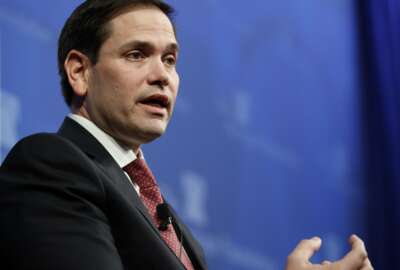
Trump administration directs TSP board to ‘immediately halt’ planned I fund changes
In a rare move, the White House on Monday ordered the Federal Retirement Thrift Investment Board to "immediately halt" plans to transition the international fund to...
The Federal Retirement Thrift Investment Board will meet Wednesday morning to discuss the path forward for the international fund, following new demands from the White House to immediately cease implementation of a new, China-inclusive benchmark.
Labor Secretary Eugene Scalia asked the board Monday to reverse course on its plans to move the I fund to the Morgan Stanley Capital International All Country World Ex-U.S. Investable Market Index (MSCI ACWI ex-USA IMI).
The index covers 22 developed and 26 emerging markets and consists of large, mid and small-cap stocks from more than 6,000 companies, including Chinese securities.
But the board’s plans for the I fund have come under intense scrutiny from members of Congress on both sides of the aisle, who have argued the move would expose the retirement assets of federal employees and military members to severe and undisclosed risks with Chinese companies.
“At the direction of President Trump, the board is to immediately halt all steps associated with investing the I fund according to the MSCI ACWI ex USA IMI, and to reverse its decision to invest plan assets on the basis of that international equities index,” Scalia said in a letter to FRTIB Chairman Michael Kennedy.
Scalia’s letter follows a separate one from Larry Kudlow, director of the National Economic Council, and Robert O’Brien, assistant to the president for national security affairs.
In their own letter to Scalia, Kudlow and O’Brien detailed their rationale for reversing the course, calling the planned I fund changes as “risky and unjustified.”
“The Federal Retirement Thrift Investment Board is set to implement these plans during a time of mounting uncertainty concerning China’s relations with the rest of the world, including the possibility that future sanctions will result from the culpable actions of the Chinese government with respect to the global spread of the COVID-19 pandemic,” Kudlow and O’Brien said. “In view of these considerations, we do not believe that proceeding with the investment of the retirement savings of hardworking federal workers in Chinese companies is prudent.”
They also cited doubts about the move from the Securities and Exchange Commission and the Public Company Accounting Oversight Board. PCAOB, according to Kudlow and O’Brien, has been unable to oversee the audits of Chinese companies who might be violating U.S. laws.
“This is now the only acceptable course, given the concerns expressed by the president’s advisors and the chairs of the SEC and PCAOB, as well, of course, as the president’s own directive to the board,” Scalia said.
The TSP had been planning to move the I fund to the index in a matter of weeks or months, Kim Weaver, the FRTIB’s director of external affairs, told Federal News Network last week.
Now, the board has until Wednesday to confirm it will make the president’s desired changes, Scalia said.
Trump moved last week to replace three of the five FRTIB members. The terms for all five board members have technically expired, but unlike other independent agencies, the FRTIB members can serve past their nominated terms.
The president had yet to nominate his own appointees to the TSP board — until last week. The nominees, if confirmed in the Senate, would set the FRTIB up to consider new changes to the I fund.
“Deferring the MSCI ACWI ex USA IMI investment will enable a newly-constituted board, impaneled with the advice and consent of the Senate, to decide what index — if any — should be selected to replace the current I fund index,” Scalia said.
Frustrations over the TSP and its plans for the I fund stem from a decision the FRTIB made back in 2017.
Following the advice of an independent consulting firm, the board originally chose to move the I fund to the new, China-inclusive benchmark three years ago. But when members of Congress expressed bipartisan concern last fall with the move, the board reconsidered.
Eventually, the majority of the FRTIB members agreed to press ahead with the original plans, drawing on arguments that failing to the move the I fund to a new benchmark would make the TSP an outlier among other comparable 401(k) style plans.
According to Aon Hewitt Investment, the consultant that advised the FRTIB on this move, both the top 10 publicly traded U.S. companies and the top 10 federal contractors all offer their defined contribution participants access to an emerging market equity, including China.
Read more TSP news
The Employee Thrift Advisory Council, a coalition of unions and other organizations representing federal employees, has dismissed the I fund debate as a partisan one.
The FRTIB manages federal employees’ retirement assets, which are not property of the U.S. government. TSP participants themselves choose where to invest their savings, not the board or Congress.
Federal employees don’t have to invest their savings in the I fund unless they want to, the council has argued.
The I fund, however, is the only TSP fund where participants can invest internationally.
Kudlow and O’Brien suggested the FRTIB may have other alternatives where it could still expand I fund investment offerings but avoid Chinese-listed equities.
“Even if the board believed that the I fund’s investments should expand to include what MSCI has labeled “emerging markets,” there are means by which the board could make investments broadly tracking the rest of those markets while excluding China, given the unique concerns associated with companies on Chinese exhanges,” the letter reads.
The FRTIB is scheduled to review the letters from Scalia and the White House Wednesday morning.
Copyright © 2024 Federal News Network. All rights reserved. This website is not intended for users located within the European Economic Area.
Nicole Ogrysko is a reporter for Federal News Network focusing on the federal workforce and federal pay and benefits.
Follow @nogryskoWFED






